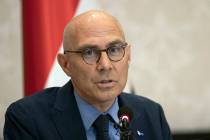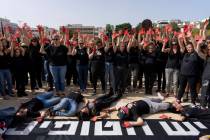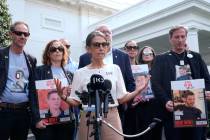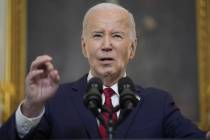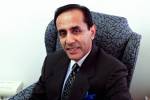Mexican official sets sights on ‘botanicas’
Call them snake oil salesmen.
That's how Mariano Lemus Gas, the consul for Mexico in Las Vegas, characterized owners of some "natural medicine" stores that have proliferated in Hispanic neighborhoods in recent years.
"These are charlatans who are committing fraud," Lemus Gas said Wednesday.
Some of the small, strip mall "botanicas," which advertise natural and herbal medicines, offer customers much worse than a simple scam, the consul said at a special meeting called to discuss the issue. Some harbor unlicensed "doctors" who may be putting lives at risk.
"You, as leaders, have the responsibility to convince people of the dangers of visiting such places," Lemus Gas told about 30 people gathered at the Latin Chamber of Commerce. "We need safe, legal medical care."
The consul decided to organize a meeting in Spanish with leaders in the Hispanic community after hearing that two local "botanicas" were ordered to cease operations last month because of allegations of unlicensed surgeries.
State health officials delivered cease-and-desist letters to "Botanica Maya" and its sister store, "Botanica San Francisco" after gathering information from a female victim of a botched gynecological surgery at Botanica Maya. They also found medical waste in the store and in a trash bin behind the business on Lake Mead Boulevard near Nellis Boulevard.
It's a poorly kept secret that many such botanicas dispense medical advice and drugs not legally available in the United States without a prescription.
Some reportedly also host weekend visits from Central American "doctors" who set up shop in back rooms of the botanicas, offering consultations for a fee.
Such visits have health care workers increasingly worried.
"You have no idea what the education level of these 'doctors' is," said Rogelio Machuca, a bilingual physician who practices family medicine. "Just because they wear white coats doesn't mean they are doctors."
Such "doctors" may administer the wrong medications, putting a patient's health at risk, Machuca said.
Immigrants sometimes fall prey to such operations because they might lack health insurance or believe that proper treatment will be too expensive, said Maria Emilia Guenechea, projects coordinator for the Latino Research Center at the University of Nevada, Reno.
They often wind up paying even more for services at a small "botanica" than they would at a licensed clinic, she said.
It's also common in other countries for people to go to their local pharmacies to get medical advice and pick up certain drugs that wouldn't be available in the United States without a prescription. If someone accustomed to that system then moves to the U.S., they might seek out the familiar routine.
Immigrants who are living in the country illegally might also think they can't get care at a medical clinic or hospital, and they might not speak English well, Guenechea said. Heading to their local botanica might feel more comfortable.
"We need to tell people to ask to see the licenses of these so-called 'doctors'" at botanicas, she said, adding that there are many licensed local doctors who speak Spanish.
Lemus Gas and others also criticized advertising in botanicas and on local Spanish-language radio stations that hawks "miracle liquids" from people claiming to be doctors.
"There are several people selling products claiming to cure everything," said Xavier Rivas, a commissioner with Nevada's Commission on Minority Affairs. "They take advantage of people."
Leaders in the Hispanic community need to help spread the word about such questionable products and the dangers of seeking medical help at unlicensed facilities, Guenechea said.
"If we don't do something, they will continue abusing our community."
Contact reporter Lynnette Curtis at lcurtis @reviewjournal.com or 702-383-0285.












